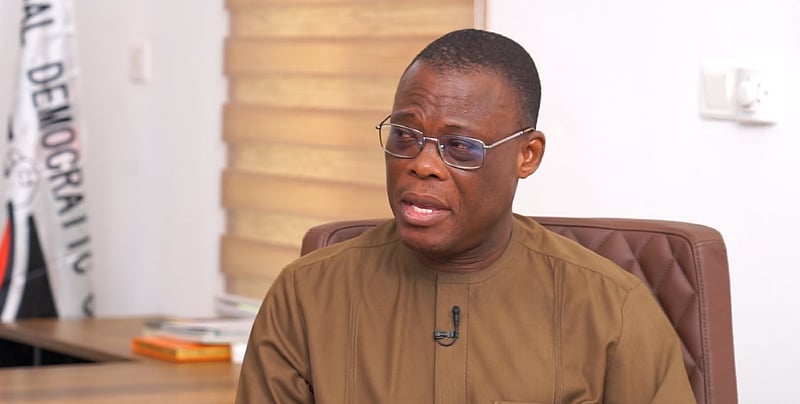Fifi Kwetey, General Secretary of the National Democratic Congress (NDC), has launched a fervent appeal for comprehensive constitutional reforms aimed at disentangling the roles of Members of Parliament (MPs) from ministerial appointments. Kwetey argues that the current system, which allows MPs to serve concurrently as ministers, has eroded the integrity and independence of the legislature, transforming it from a body designed to scrutinize the executive into a stepping stone for aspiring ministers. He posits that this fusion of legislative and executive functions has created a perverse incentive structure where parliamentary hopefuls primarily seek legislative office as a means to secure ministerial positions, rather than a genuine desire to serve their constituents through legislative work.
Kwetey’s core argument revolves around the idea that the pursuit of ministerial appointments has distorted the motivations of aspiring MPs. He contends that many individuals enter Parliament not with the primary goal of representing their constituents and contributing to the legislative process, but with the ulterior motive of gaining access to executive power. This, he argues, undermines the democratic principle of representation and transforms the legislature into a mere recruitment pool for the executive branch. He emphasizes that the role of an MP should be driven by a genuine commitment to serving the people through robust legislative work, and that ministerial appointments should be viewed as a secondary “bonus,” not the primary objective of seeking parliamentary office.
To rectify this perceived imbalance and restore the integrity of Parliament, Kwetey advocates for a fundamental restructuring of the relationship between the legislature and the executive. He proposes a constitutional amendment that would sever the link between parliamentary membership and ministerial appointments, effectively creating two distinct and independent career paths. This separation, he argues, would ensure that individuals seeking parliamentary seats are genuinely motivated by a desire to serve their constituents through legislative work, rather than by the allure of executive power. It would also foster a culture of independence within Parliament, allowing MPs to effectively scrutinize the executive without fear of jeopardizing their chances of securing a ministerial position.
Kwetey’s critique extends beyond the motivations of individual MPs to encompass the broader impact of the current system on the functioning of Parliament as a whole. He contends that the intertwined nature of legislative and executive roles has weakened Parliament’s ability to effectively check the power of the executive branch. MPs who aspire to ministerial positions, he argues, are less likely to critically scrutinize the government’s actions, fearing that such scrutiny might jeopardize their chances of being appointed to a ministerial role. This, in turn, undermines the principle of checks and balances, a cornerstone of democratic governance, and allows the executive to operate with less accountability.
The current system, according to Kwetey, also perpetuates a culture of deception within the political landscape. Candidates vying for parliamentary seats, he argues, often present themselves as dedicated public servants committed to representing their constituents’ interests in the legislature. However, their true motivations, Kwetey suggests, often lie in securing a ministerial appointment. This inherent conflict of interest creates a disconnect between the promises made during election campaigns and the actual priorities of MPs once they are elected. The electorate, therefore, is misled into believing that their representatives are primarily focused on legislative duties, while in reality, their focus may be on gaining access to executive power.
To address this issue, Kwetey reiterates his call for a constitutional review that would decouple parliamentary membership from ministerial appointments. This decoupling, he argues, is crucial for restoring the integrity and independence of Parliament and ensuring that it functions as a true check on the executive branch. He envisions a Parliament where MPs are driven by a genuine commitment to serving their constituents through legislative work, free from the distractions and temptations of ministerial aspirations. Such a reform, Kwetey concludes, would strengthen Ghana’s democratic institutions and promote a more accountable and transparent government. He urges the country to prioritize this constitutional reform, emphasizing that it is essential for restoring the balance of power between the legislature and the executive and ensuring that Parliament effectively fulfills its constitutional mandate.


